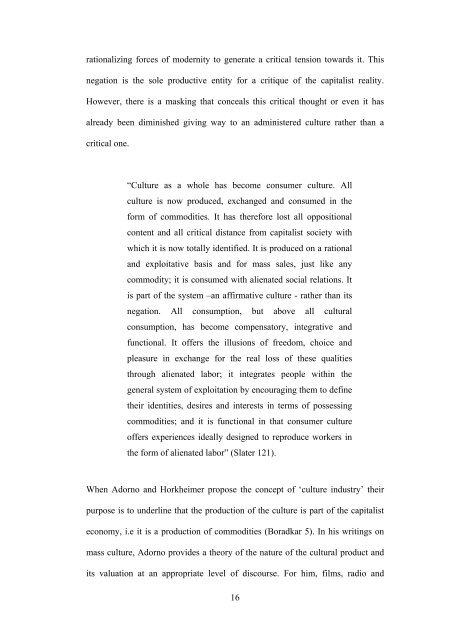virtualization of design and production a thesis - Bilkent University
virtualization of design and production a thesis - Bilkent University
virtualization of design and production a thesis - Bilkent University
Create successful ePaper yourself
Turn your PDF publications into a flip-book with our unique Google optimized e-Paper software.
ationalizing forces <strong>of</strong> modernity to generate a critical tension towards it. This<br />
negation is the sole productive entity for a critique <strong>of</strong> the capitalist reality.<br />
However, there is a masking that conceals this critical thought or even it has<br />
already been diminished giving way to an administered culture rather than a<br />
critical one.<br />
“Culture as a whole has become consumer culture. All<br />
culture is now produced, exchanged <strong>and</strong> consumed in the<br />
form <strong>of</strong> commodities. It has therefore lost all oppositional<br />
content <strong>and</strong> all critical distance from capitalist society with<br />
which it is now totally identified. It is produced on a rational<br />
<strong>and</strong> exploitative basis <strong>and</strong> for mass sales, just like any<br />
commodity; it is consumed with alienated social relations. It<br />
is part <strong>of</strong> the system –an affirmative culture - rather than its<br />
negation. All consumption, but above all cultural<br />
consumption, has become compensatory, integrative <strong>and</strong><br />
functional. It <strong>of</strong>fers the illusions <strong>of</strong> freedom, choice <strong>and</strong><br />
pleasure in exchange for the real loss <strong>of</strong> these qualities<br />
through alienated labor; it integrates people within the<br />
general system <strong>of</strong> exploitation by encouraging them to define<br />
their identities, desires <strong>and</strong> interests in terms <strong>of</strong> possessing<br />
commodities; <strong>and</strong> it is functional in that consumer culture<br />
<strong>of</strong>fers experiences ideally <strong>design</strong>ed to reproduce workers in<br />
the form <strong>of</strong> alienated labor” (Slater 121).<br />
When Adorno <strong>and</strong> Horkheimer propose the concept <strong>of</strong> ‘culture industry’ their<br />
purpose is to underline that the <strong>production</strong> <strong>of</strong> the culture is part <strong>of</strong> the capitalist<br />
economy, i.e it is a <strong>production</strong> <strong>of</strong> commodities (Boradkar 5). In his writings on<br />
mass culture, Adorno provides a theory <strong>of</strong> the nature <strong>of</strong> the cultural product <strong>and</strong><br />
its valuation at an appropriate level <strong>of</strong> discourse. For him, films, radio <strong>and</strong><br />
16
















